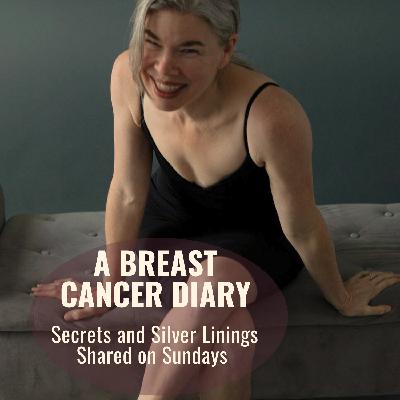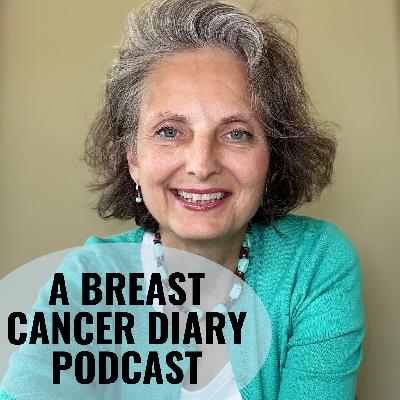What's Capsular Contracture?
Description
Today I'm reflecting on the science related to last week's episode talking to Christina Miner about her Capsular Contracture and Breast Implant Rupture. Lot's of good resources linked below about this....
Links:
Another great podcast episode on the history of implant mis-regulation is here.
The checklist I mentioned is here: https://www.center4research.org/wp-content/uploads/2019/07/Black-Box-and-Checklist-Consent-Form-PDF.pdf
A report on Breast Implant Illness is here: https://www.center4research.org/wp-content/uploads/2021/01/Breast-Implant-Illnesses-Whats-the-Evidence.pdf
The website I mentioned for implant-associated lymphoma is here: https://justcallmeray.org/
And a short interview about Squamous Cell Cancer and implants: https://podcasts.apple.com/us/podcast/breastcancer-org-podcast/id781242172?i=1000584263441
A great advocacy group that will help you to advocate for better research: https://ourbodiesourselves.org/
Transcript:
Today's another solo episode where I'm reflecting on my last guest conversation with Christina Miner. We talked about capsular contracture in the last episode, and I just want to reflect a little bit more on the meaning of this, the implications of this, the frequency of this, and a little bit about some of the risk factors.
I realize that this is a very controversial and touchy issue. And by talking about these things, I want to remind listeners that I'm not taking a side. I don't have an opinion on whether breast implants are good or bad. I feel like it's still very gray, and it's a very personal decision, very much having to do with your tolerance for risk.
I feel like I made an intentional choice to invite my first guest on, Michaela Raes, to talk about her positive experience with implants because I do feel like I am skewed in that most of my friends in the breast cancer community are flatties and a lot of those friends have explanted it because they have become sick as a result of their breast implants.
But I don't want this podcast to be singularly about the flattie perspective and rah rah flatties. I really want it to be helpful for everyone in the breast cancer community. And I'm doing this episode in particular, not just for the brand new patient that has to decide about whether or not to get implants.
I'm doing this episode to talk about ongoing risks for my friends out there who already have implants. You need to be vigilant. You need to watch those implants over the years. And certainly you need to get them replaced when they're wearing down and breaking down in your body.
It's still the case that most of the people who get breast implants are not breast cancer survivors. About two thirds to three quarters of the folks who get breast implants are just getting augmentation. They are not cancer survivors. And so these things that I'm talking about today, whether it be capsular contracture or breast implant illness or cancer, So I'm going to read the definition from the National Center for Health Research about what capsular contracture is.
Their definition says it's one of the most common complications of breast implants. In fact, it's over 50 percent of the population of those who get breast implants that have some amount of capsular contracture. Capsular contracture is when the scar tissue capsule that forms around the implant hardens.
So it's natural for an implant to have scar tissue around it, but it's not natural or intended for that scar tissue to harden. And in some cases, the hardening of that tissue can be quite painful. And it can distort the shape of the breast, and it can make mammography more painful and less accurate.
Removing the implant and the capsule without replacing the implant is the only recommended way to guarantee that this problem is corrected. According to the National Center for Health Research. Which is a National non profit think tank and lobbying group that tries to help the FDA be more responsible in its use of or approval of medical devices in general.
It's kind of the main aim of that organization.
Now with capsular contracture, you don't always have a problem for the patient. If it's just slight hardening, it may not be something the patient ever notices or is bothered by. Uh, but I, when I go to breast cancer walks and I table for Stand Tall, AFC, to talk to folks about flat closure. A lot of times I will have women walk up to me and talk to me about how unhappy she is with her implants.
And the most common complaint is that they're rock hard. And why didn't they tell me these things were going to be rock hard? I don't like hugging people anymore. I don't like holding my children because I've got these rocks in between me and my children. What they're describing is, I now know is capsular contracture, but because we don't go back to our plastic surgeons and have ongoing conversations with them about how our breasts are feeling and how we're experiencing our breasts, we don't get told that.
And so, you know, you can go on and on and even be in a breast cancer support group and have three or four of the other women in that group say, Oh yeah, mine are really hard too. I guess that's just the way it goes. So when I'm tabling now and I hear that story, I tell women to please go back
to their plastic surgeons and ask for them to advocate for the insurance company to pay for removal of their implants and to get a Goldilocks procedure instead. You can still have a small breast with just the skin that's around your implant. with a Goldilocks procedure and most plastic surgeons are very happy to do that.
Very, very cognizant of the discomfort of capsular contracture and the fact that it's not an intended outcome. It's not something that they want for you.
So with Christina, she had an extreme case of a capsular contracture. Not only did she have lots of hardening, lots of contortion, but that thing was being eaten by her body. It was also an immune reaction. She was having multiple responses to the implant, and she experienced rupture, which is another side effect and possible risk factor in getting implants that we just don't hear about.
Even folks that are given implants, they don't get to read about or talk about the likelihood that they would have a rupture or a leak. And so I want to read the description from the National Center for Health Research about rupture and leak. When a saline implant ruptures, it usually deflates quickly.
But when a silicone gel implant ruptures, you may not notice any changes. And the rupture may not be detected by a doctor or a mammogram or an MRI or ultrasound. And MRI is recommended for silicone implants every 3 years for everyone following surgery. And every 2 years after that to check for a silent rupture.
So it's likely that after 3 or 5 years that your breast implant will rupture. And you may not know it if you have a silicone implant. These MRIs that are recommended for follow up are not usually covered by health insurance, and this is something that people really should have been told really early on.
Um, they are highly recommended to, um, just make sure that your implants are still intact and still the same shape that they should be, but they may not be paid for by your health insurance, which is a really big bummer. And silicone might migrate in to the nearby tissues such as the chest wall, lymph nodes, upper abdominal wall, and into organs such as the liver or lungs where it can't be removed.
And since migrated silicone can cause health problems, it's currently recommended that any ruptured silicone implant should be removed immediately after the rupture. And treatment of these conditions might be at your own expense, not covered by insurance, or the manufacturer's warranty, unfortunately. And when I talk to friends in the breast cancer community that have had their implants, for more than 10 years already. A lot of times they have a really nonchalant attitude about that. Oh, I'm sure it'll last 20 years. I heard somebody say that their aunt's lasted 20 years.
Maybe mine will too. I really discourage them from letting it go that long because the likelihood is that It will break down in your body and you will have some health effects from it.
So another risk of breast implantation is something that we talked about in episode 13 with my friend Anna. She had something called breast implant illness. And this is something that's really hard to quantify or even explain in an objective way since the medical community has still not come together around a definition of it.
It is. very well acknowledged by most medical professionals now as a true condition. So that's good. That's progress over about 10 to 20 years ago when it was kind of denied in the medical community. And the FDA has started to study it, which is







